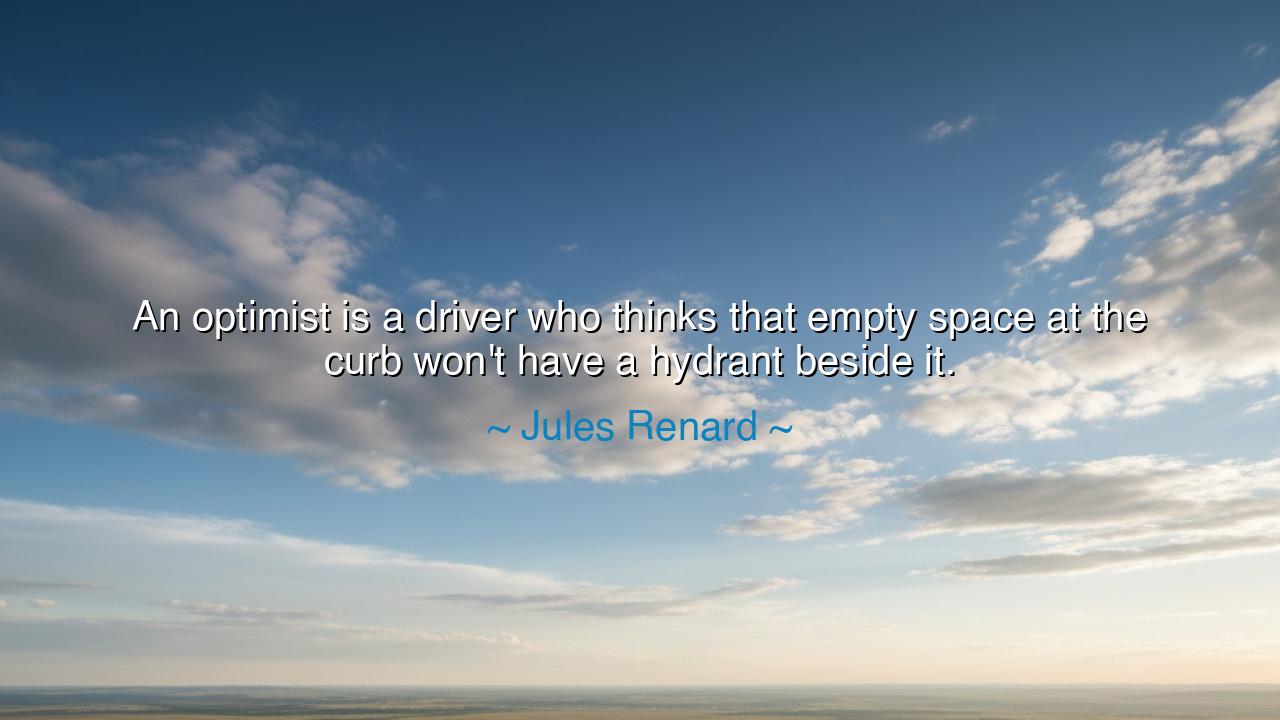
An optimist is a driver who thinks that empty space at the curb
An optimist is a driver who thinks that empty space at the curb won't have a hydrant beside it.






Hear the wry wisdom of Jules Renard, master of wit and observer of the human heart: “An optimist is a driver who thinks that empty space at the curb won’t have a hydrant beside it.” At first, his words seem but a small jest, a quip about the search for parking. Yet within the humor lies a truth about human nature, about hope, expectation, and the folly and glory of optimism. For in the empty space, the optimist sees promise, while the pessimist sees disappointment already waiting.
The hydrant here is the symbol of life’s hidden obstacles—the unseen barrier that prevents us from seizing what looks like opportunity. How many times do we see an open path, only to find at the moment of grasping that something blocks the way? The pessimist, having suffered before, learns to expect the hydrant in every space; the optimist, despite all evidence, continues to believe that this time, perhaps, the space will be truly open. Renard mocks this hope, but in his mockery, he reveals its strange beauty.
For history is filled with both kinds of souls. The pessimist shrugs at the Wright brothers and says, “Man was not meant to fly; the sky is filled with hydrants.” But the optimist builds a fragile craft and takes to the air. The pessimist warns Edison that a thousand failed filaments prove the light bulb impossible. The optimist tries a thousand and one, and the darkness of the world is broken by light. Yes, optimism often collides with hydrants, but it is optimism alone that dares to move forward.
Yet we must also admit the humor in Renard’s caution. Blind optimism, untempered by awareness, may waste time, energy, and hope. A driver who expects every space to be free is bound to frustration. In this way, his quip is not only about hope but also about wisdom. To live is to balance: to carry optimism enough to try, but realism enough to prepare. The wise soul is one who seeks the empty space with faith but keeps watch for the hydrant with prudence.
Consider explorers through history. Christopher Columbus sailed west, optimist to the core, believing he would reach Asia. He was wrong in his details but right in his faith, for he found a New World instead. His optimism opened horizons for all mankind, though it was later tempered by the tragedies of conquest. Here is the paradox Renard points to: optimism opens doors that realism alone would keep shut, yet it must walk hand in hand with awareness, lest it stumble blindly into folly.
The lesson for us is this: optimism is the force that propels action, even when reason whispers of obstacles. But let not optimism be naïve. Hope must be wedded to preparation. Drive toward the open spaces, yes, but know the hydrants exist. If they block you, laugh, adjust, and try again. For the true optimist is not one who always finds an open space, but one who, finding a hydrant, still believes the next turn will bring another chance.
Therefore, O seekers of wisdom, let Renard’s jest remind you: life is filled with hydrants, but also with spaces waiting to be claimed. Do not surrender to cynicism, for that is the coward’s way. Do not be blinded by empty hope, for that is folly. Instead, be the bold driver: ever seeking, ever hopeful, ready to laugh when blocked, but ever turning the corner again. For the optimist, mocked though he may be, is the one who carries humanity forward—one curb, one chance, one open space at a time.






AAdministratorAdministrator
Welcome, honored guests. Please leave a comment, we will respond soon